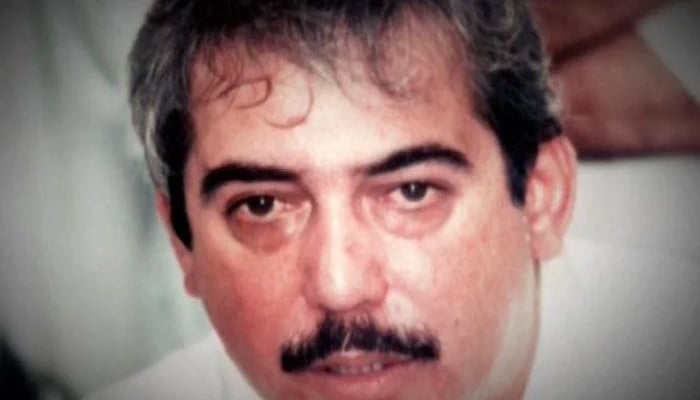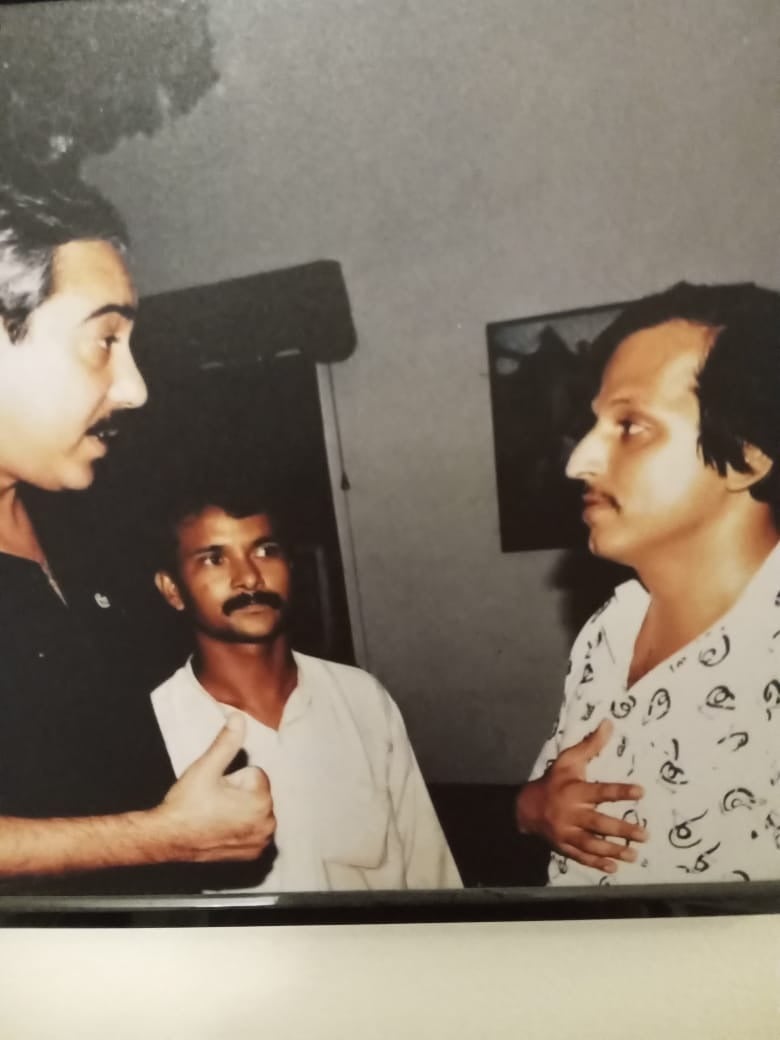Murtaza Bhutto’s assassination: Some untold facts
I have been able to piece together certain facts based on interviews and off the record conversations with the Bhuttos and some suspects in the case
September 20, 2022

What really happened on that fateful night, 26 years back, on September 20, 1996, when Mir Murtaza Bhutto, the eldest son of former Prime Minister Zulfiqar Ali Bhutto and brother of another then PM Benazir Bhutto, was assassinated? Moreover, who violated the specific directive given by then PM Benazir Bhutto to the interior minister, late Lt. General Naseerullah Babar: “Arrest Mir’s security guards when he is not in Karachi”?
If the top police officers, from Sohaib Suddle to Wajid Durrani, were not aware of the happenings near 70’ Clifton, who ordered the police to “fire”, as Murtaza shouted, “don't fire”?
The case file of the murder was closed as all the suspects named in the two FIRs registered were acquitted and no fresh investigation was ever ordered. However, I have been able to piece together certain facts based on interviews and off the record conversations over this period with late Benazir Bhutto, Ms Ghinwa Bhutto (widow of Mir Murtaza Bhutto), and some of the suspects in the case including police officials.
Months before Benazir Bhutto’s instructions about the arrest of Murtaza’s guards, a senior police officer on condition of anonymity told me that even he had been told by his superior to arrest some of Murtaza’s wanted guards while he was not in town — and he did.
“I was posted at Airport Police Station and had instructions to arrest two of Murtaza’s security guards wanted in a criminal case. Murtaza was in Peshawar that day and was about to return. So, I took my police escort and an hour before his arrival, arrested them. I informed the IGP, and he told me not to keep them at the Airport police station, so I shifted them,” the officer disclosed, adding that Murtaza, after his arrival was informed by the driver of what had happened. He reached the police station but found no one and left.
“That day I got a call from SHO Haq Nawaz Sial, who had worked under me, who told me ‘Sir, something terrible has happened. Murtaza Bhutto was shot by a police team. I don’t know what to do’,” the officer quoted Sial, as saying, adding that he calmed the SHO down.
“What he said next was shocking for me,” the officer continued, as he narrated what had happened. “Sir, I myself also got slightly injured with a bullet,” he quoted the SHO as telling him. The officer said that when he took the news to Suddle, Suddle said he knew about Sial’s “stupidity”.
Sial’s “suicidal death” later raised many questions as he was the key officer in this case but if what the said officer told me stands true, one would not be surprised if it was indeed a suicide.
But the key question in this case remains: Who was constantly ignoring Benazir’s orders? It just so happened that two days before the incident , one of Murtaza’s most trusted men, Ali Sonara, was arrested.
I have known Sonara, a highly emotional ‘jiyala’, since the 70s. I was a witness to an incident involving him in conversation with the former chief minister Syed Qaim Ali Shah during a seminar, in the presence of Begum Nusrat Bhutto. He asked Shah sahab: “When will you give people of Lyari jobs.?” Shah sahab replied in a polite manner, “We are trying to create jobs as they not available at the moment”. The answer made Sonara furious. “You are giving jobs to your favourites and not to workers,” he shouted in a jam packed hall and Shah sahab was speechless. At this, Begum Bhutto asked the chief minister to satisfy the worker and thus Sonara was invited to CM House. What happened there is another story, but since I was not a witness I leave it here.
Sonara soon left PPP after Benazir, in a meeting with PPP workers at 70 Clifton, said that all those who wanted to go join Murtaza are at liberty to do so. Sonara was among the few who once used to look after Benazir’s security. As she had allowed it, he moved camp when in 1993 Murtaza formed PPP (SB).
So, on the night when Sonara was picked up by the CIA and Murtaza came to know, he rushed to the CIA centre in Saddar and later to another centre in search of Sonara. He asked the officers present there to show him the arrest warrant and the FIR against Sonara.
Sources aware of those developments said that when Benazir came to know that Murtaza had misbehaved with police officers, she enquired from Naseerullah Babar and repeated her advice to avoid his men’s arrest when he was in town.
“I know him and his temper too,” she once told me. “He is a very loving and calm person otherwise,” she added.
All this begs the question: Was it all staged to prepare a case against Murtaza for September 20?
Now, this date also has special significance in my personal life. It is my eldest daughter’s birthday. So, when I got the call from 70 Clifton for a press conference at 3 pm, I along with my senior colleague Idress Bakhtiar and junior colleague Riffat Saeed went there. On our return I noticed some unusual activity, all the way from around the house to Do Talwar. I said, “Idrees sahab something is wrong”, as I noticed some plainclothes men standing at different corners waving at each other. He replied with his typical smile, “You and your conspiracy theories”, and we all laughed.

Earlier, before leaving for his public meeting, Murtaza reportedly lashed out at Benazir Bhutto’s government and Asif Ali Zardari. After the presser, he asked me to accompany him and witness his public meeting at Surjani Town. I excused myself, saying it was my daughter’s birthday. “Oh, oh, mubarak ho. We will meet soon,” were his last words to me.
What followed a few hours later confirmed my earlier apprehensions and this time Idrees sahab said to me, “You and your journalistic instinct.”
Although my digging around unearthed some events that occurred that day, many questions have been left unanswered.
1. Who ordered the arrest of Murtaza’s guards, knowing fully well about the possible reaction as seen in Sonara’s case? Especially since IG Sohaib Suddle — whose official residence was just across the road where Murtaza was killed — denied he had prior knowledge about the plan. SSP South, Wajid Durrani, was also reportedly not aware. It is hard to believe that the police party ready for the operation to stop Murtaza’s security vehicle that included officers like late Shahid Hayat, Rai Tahir and Shakaib Qureshi had taken the decision on their own.
2. What really happened when the police stopped the car which was just behind Murtaza’s vehicle? It was said on record that the police never wanted to arrest Murtaza, so they allowed his car to pass and it reached 70 Clifton but after learning of the scuffle between the police and his guards, Murtaza rushed back, leaving the car at home. As he was walking towards the police busy in arguing and ordering his guards to surrender, he shouted to the police from some distance, “Don’t open fire”, as he heard a shot.
3. I give the benefit of the doubt to the police when it comes to rushing him to the nearby Mideast Hospital, which incidentally belongs to the family of Ashiq Jatoi, Murtaza’s party leader who too was killed in this shootout. But, they were immediately told that they did not have the concerned doctors available, and not enough medical equipment. By that time Murtaza was conscious so could he not have been rushed to Civil or Jinnah hospital with police easily clearing the road as is done for VVIP protocol?
4. Why was the spot where he died washed out that same night unlike in many such cases? It could be a coincidence but in Benazir’s murder, too, the spot was washed out when an investigation had not even formally begun.
5. Why did the government and the police try to hide the ‘encounter’ as a routine event, like many such encounters which had taken place since a 1995 ‘police operation’ against alleged MQM militants?
6. Why were Sial and Shahid Hayat’s alleged self-inflicted injuries on their feet and thighs never probed as it could have easily established whether it was an encounter or a targeted attack to kill Murtaza?
7. How come all police officers, rightly or wrongly arrested and tried in the case, got their promotions and service grades bumped up even before they all were ‘acquitted’?
A month and half later, on November 5, 1996, Benazir’s own nominated President of Pakistan, Farooq Leghari, dismissed her government. Zulfiqar Ali Bhutto’s cousin, late Mumtaz Ali Bhutto, was appointed a caretaker chief minister and after elections in 1997, Liaquat Jatoi was elected Sindh chief minister.
A Judicial Commission headed by retired Justice Nasir Aslam Zahid was constituted which established the police party as aggressors.
It may be noted that Justice Zahid had confronted many such cases of ‘extrajudicial killings’ of the MQM leaders and workers and had even ordered some police officers either to be sacked or transferred to other provinces but his orders and observations had been ignored.
The assassination of Mir Murtaza Bhutto occurred near 70 Clifton, residence of former Prime Minister, Zulfiqar Ali Bhutto. The house, which had seen many ups and downs in politics, produced two prime ministers and buried four Bhuttos: Zulfikar Ali Bhutto, Shahnawaz Bhutto, Murtaza Bhutto, and Benazir Bhutto and in the end, Begum Nusrat Bhutto.
Tragically, the venue where Murtaza was assassinated was just opposition the gate of the park where Benazir’s private valima reception was held in 1987 while a public reception was held in Lyari’s Peoples’ ground.
Murtaza’s murder caused a serious dent in the Bhuttos’ dynastic politics. Benazir, who herself was killed in yet another mysterious attack, and to this day neither has the conspiracy unfolded nor the actual killers arrested.
Murtaza’s daughter Fatima Bhutto and her brother Zulfiqar Jr., were inside the house when she heard shots and immediately called Prime Minister House in a bid to talk to her aunt, but the line was not connected. In her book ’Songs of Blood and Sword’ she said that instead, Zardari came online and said, "She can’t come to the phone right now." “But, I want to talk to her,” Fatima said, to which Zardari replied, “Don’t you know your father’s been shot?”
“I dropped the phone," she writes.
Karachi has its own ‘violent history’ and dozens of political workers, leaders, writers, religious scholars, social, rights and women activists have been killed in this city, where you also have a rare ‘graveyard for the unknown.’
During my reporting years with newspapers and news agencies I have seen scores of judicial reports on ‘extra-judicial killings’ and found one commonality in the majority of the findings, including the one in which a Ranger had killed a boy from point blank. That commonality is the one sentence that 'put to rest' all findings and closed all files: “Killed in the line of duty."
Former IGP Sindh, Afzal Shigri, who opposed the state policy when General Babar in 1995 ordered MQM militants sought out in a similar way, once told me: ”My contention was simple, and that was, you can’t give a blank cheque to the police, otherwise they will settle their personal scores as well.”
I still remember Benazir's last conversation on this subject when she said: "I was badly misguided and misinformed about the investigation."
Yet another Bhutto is dead, yet another probe remains incomplete.
The writer is a columnist and analyst for GEO, The News and Jang
Twitter:@MazharAbbasGEO











